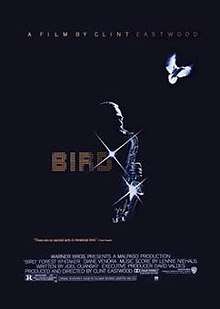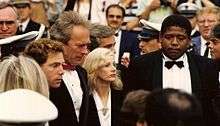Bird (1988 film)
| Bird | |
|---|---|
 | |
| Directed by | Clint Eastwood |
| Produced by | Clint Eastwood |
| Written by | Joel Oliansky |
| Starring | |
| Music by | Lennie Niehaus |
| Cinematography | Jack N. Green |
| Edited by | Joel Cox |
Production company | |
| Distributed by | Warner Bros. Pictures |
Release date | September 30, 1988 |
Running time | 155 minutes[1] |
| Country | United States |
| Language | English |
| Budget | $9-$14.4 million[2][3] |
| Box office | $2.2 million[4] |
Bird is a 1988 American biographical film, produced and directed by Clint Eastwood from a screenplay by Joel Oliansky. The film is a tribute to the life and music of jazz saxophonist Charlie "Bird" Parker. It is constructed as a montage of scenes from Parker's life, from his childhood in Kansas City, through his early death at the age of 34.
The film moves back and forth through Parker's history, blending moments to find some truth to his life. Much of the movie revolves around his only grounding relationships with wife Chan Parker, Bebop pioneer trumpet player and band leader Dizzy Gillespie, and his influence (both musically and into the world of heroin addiction) on trumpet player Red Rodney.
Plot
In 1939 Kansas City, Missouri, young alto saxophone player Charlie "Bird" Parker (Forest Whitaker) performs at the Reno Club. However, his rapid and sporadic playing gets him jeered offstage. Moving to New York City, Charlie begins performing at different jazz venues on 52nd Street and meets trumpeter Dizzy Gillespie (Samuel E. Wright). While Charlie performs with Dizzy, their specific style of jazz becomes popular and is known as "bebop."
One evening, Charlie meets Chan Parker (Diane Venora), a dancer and jazz lover. Attracted to Chan, Charlie continually asks her out, but she refuses his advances and moves to Chicago, Illinois. Later, Chan returns from Chicago and confesses she is pregnant with another man’s child. Upset, Charlie leaves for Los Angeles, California, to perform with Dizzy. One evening, Red Rodney (Michael Zelniker), a Jewish trumpet player, approaches Charlie and tells him he is a fan. Later, Charlie and Dizzy’s engagement is cancelled due to a lack of interest in bebop. Charlie stays in Los Angeles, but his addiction to drugs and alcohol worsen, and he is hospitalized for eight months.
After getting clean, Chan gets Charlie a job at club in New York. When he thanks Chan for her help, she introduces him to her daughter, Kim. Later, Charlie learns that his friend, Brewster, is opening a new club and naming it Birdland after Charlie. In need of work and money, Charlie travels to Paris, France, and finds an audience for jazz and bebop. However, he returns to New York and perform at Birdland.
Later, Charlie is reintroduced to trumpet player Red Rodney. Waiting for Birdland to open, Charlie offers Red a job touring with him in the South. Although Red is hesitant about how an interracial band might be received, Charlie assures him no harm will come to them. Arriving at their first engagement, Red sees Charlie has advertised him as being a blues singer named “Albino Red.” During the tour, Charlie learns that Red is addicted to heroin and threatens him to stop using drugs.
Returning to New York, Charlie and Red perform together for Birdland’s grand opening. Afterward, authorities pick up Red for drug possession. Charlie continues to perform at Birdland and other New York clubs. Chan and Kim move in with Charlie, and he and Chan have two children of their own: son Baird, and daughter Pree.
Sometime later, Charlie is arrested for drug possession and put on probation. Charlie loses his cabaret card and is unable to play in New York. Hence, he leaves for Los Angeles for work and reconnects with Dizzy Gillespie, who sees that Charlie is using drugs again. Later, Charlie learns that Pree has died from an illness and returns home for her funeral. Depressed by Pree’s death and his faltering career, Charlie tries to kill himself by drinking iodine, but survives. After Chan admits him into a hospital psychiatric ward, she is advised to send Charlie to a state facility for shock treatments. She worries that such treatments might rob Charlie of his creative abilities. After Charlie is released, Chan convinces him to move their family to upstate New York.
Charlie later returns to the city for an audition set up by Brewster, but becomes distracted seeing all the former jazz clubs on 52nd Street have been turned into strip clubs. Missing the audition and embarrassed to tell Chan, Charlie goes to the apartment of Baroness Nica (Diane Salinger), a wealthy jazz music patron, and soon passes out. A doctor arrives and advises Charlie to go to the hospital, but he refuses. Later as he watches television with the Baroness, Charlie suffers a heart attack and dies at the age of 34.
Cast
- Forest Whitaker as Charlie "Bird" Parker
- Diane Venora as Chan Parker
- Michael Zelniker as Red Rodney
- Samuel E. Wright as Dizzy Gillespie
- Keith David as Buster Franklin
- Diane Salinger as Baroness Nica
- Michael McGuire as Brewster
- James Handy as Esteves
- Anna Thomson as Audrey
- Damon Whitaker as Young Bird
- Arlen Dean Snyder as Dr Heath
- Sam Robards as Moscowitz
- Bill Cobbs as Dr. Caulfield
- Tony Cox as Pee Wee Marquette
Production
In the 1970s, Parker's friend and colleague Teddy Edwards shared his reminiscences of the saxophonist to Oliansky, who had wanted to make a biopic about Charlie Parker starring actor Richard Pryor.[5] The property was originally owned by Columbia Pictures, which traded the rights to Warner Bros. at Eastwood's instigation, in exchange for the rights to what would become Columbia's 1990 Kevin Costner vehicle, Revenge.[3] There was a delay of a few years while the trade was completed, and by then Pryor had lost interest. The film was eventually shot in 52 days for $14.4 million, not counting Eastwood's fee,[6] although in interviews Eastwood sometimes said the film only cost $9 million to make.[2][3] Locations used for filming include the Sacramento Valley, Los Angeles, and Pasadena, California as well as New York City.[2]
Reception

Bird received positive reviews from critics, scoring a 78% "Fresh" rating on Rotten Tomatoes. Forest Whitaker's performance as Parker earned him critical acclaim and several awards, including the Best Actor award at the 1988 Cannes Film Festival[7] and a Golden Globe nomination. Clint Eastwood was awarded the Golden Globe for Best Director. In addition, the film also won the prestigious Grand Prix of the Belgian Film Critics Association and the Academy Award for Best Sound (Les Fresholtz, Dick Alexander, Vern Poore, Willie Burton).[8] The film has however been criticized for its use of composite characters, its absence of any depiction of Charlie Parker's first three wives (all of whom, unlike Chan, were African-American), and for the way it over-emphasizes his friendship and working relationship with Red Rodney (white) at the expense of Miles Davis (who is only mentioned in passing). Another common criticism of the film is that it overstates Parker's level of fame (for instance, the imaginary front-page news headline about his suicide attempt).
Music
Initially, when Columbia owned the project, the studio executives wanted to hire musicians to re-record all of Parker's music, largely because most of the original recordings were in mono, and considered of insufficient sound quality to accompany a feature film. Eastwood had some recordings of Parker made by Parker's wife, Chan, from which he had a sound engineer electronically isolate Parker's solos. Contemporary musicians such as Ray Brown, Walter Davis, Jr., Ron Carter, Barry Harris, and Red Rodney were then hired to record backing tracks on modern sound equipment. Dizzy Gillespie was on tour at the time of recording, so trumpet player Jon Faddis was hired to record his parts.[3]
References
- ↑ "Bird", Australian Classification.
- 1 2 3 Hughes, p.139
- 1 2 3 4 Pavlović, Milan (Fall 1988). "Kein Popcorn-Film (Not a Popcorn Film)". steadycam (10): 18–20.
- ↑ "Bird", Box Office Mojo.
- ↑ Interview with Teddy Edwards on ArtistInterviews
- ↑ Biskind, Peter (April 1993). "Any Which Way He Can". Premiere. New York City: Hachette Filipacchi Media U.S.: 52–60.
- ↑ "Festival de Cannes: Bird". festival-cannes.com. Archived from the original on 2011-07-28. Retrieved 2009-07-25.
- ↑ "The 61st Academy Awards (1989) Nominees and Winners". oscars.org. Retrieved 2011-10-16.
Bibliography
- Hughes, Howard (2009). Aim for the Heart. London: I.B. Tauris. ISBN 978-1-84511-902-7.
External links
- Bird on IMDb
- Bird at Rotten Tomatoes
- Bird at AllMovie
- Bird at Box Office Mojo